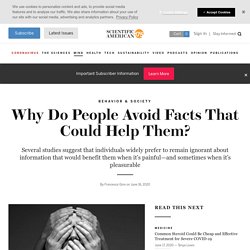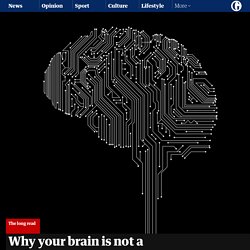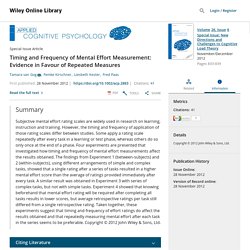

'We're constantly asked for pictures': Teen researches why sending naked pics is now normal. Kiona Osowski's Grade 12 research project started with a question, based on her own experiences as a 17-year-old teenager: why are girls so often asked for nude photos?

"I think a lot of people don't want to talk about it, but it's happening," she said. "We're constantly asked for pictures or we're sent things without our consent. " Since September, Kiona has been looking more closely at why boys feel entitled to ask for nude photos, and why girls feel compelled to send them. "This has become a societal norm and we need to start taking it apart.
" Kids sharing nude photos 'before they even hold hands' worries counsellors, police. Meet the psychologist exploring unconscious bias—and its tragic consequences for society. When Jennifer Eberhardt appeared on The Daily Show with Trevor Noah in April 2019, she had a hard time keeping a straight face.

But some of the laughs were painful. Discussing unconscious racial bias, which she has studied for years, the Stanford University psychologist mentioned the “other-race effect,” in which people have trouble recognizing faces of other racial groups. Criminals have learned to exploit the effect, she told Noah. In Oakland, California, a gang of black teenagers caused a mini–crime wave of purse snatchings among middle-aged women in Chinatown. When police asked the teens why they targeted that neighborhood, they said the Asian women, when faced with a lineup, “couldn’t tell the brothers apart.” “That is one of the most horrible, fantastic stories ever!” I Don’t Care About Net Neutrality Because I’m Fine Letting Greedy Telecom Companies Decide How I…
Originally published by Whitney Meers on November 29th 2017 And also, I don’t care about our country’s future. *** This is satire. Experts: Spy used AI-generated face to connect with targets. LONDON (AP) — Katie Jones sure seemed plugged into Washington’s political scene.

The 30-something redhead boasted a job at a top think tank and a who’s-who network of pundits and experts, from the centrist Brookings Institution to the right-wing Heritage Foundation. She was connected to a deputy assistant secretary of state, a senior aide to a senator and the economist Paul Winfree, who is being considered for a seat on the Federal Reserve. But Katie Jones doesn’t exist, The Associated Press has determined. Why Facts Don’t Change Our Minds. A recent experiment performed by Mercier and some European colleagues neatly demonstrates this asymmetry.
Participants were asked to answer a series of simple reasoning problems. They were then asked to explain their responses, and were given a chance to modify them if they identified mistakes. The majority were satisfied with their original choices; fewer than fifteen per cent changed their minds in step two. Why Do People Avoid Facts That Could Help Them? In our information age, an unprecedented amount of data are right at our fingertips.

We run genetic tests on our unborn children to prepare for the worst. We get regular cancer screenings and monitor our health on our wrist and our phone. And we can learn about our ancestral ties and genetic predispositions with a simple swab of saliva. Yet there’s some information that many of us do not want to know. A study of more than 2,000 people in Germany and Spain by Gerd Gigerenzer of the Max Planck Institute for Human Development in Berlin and Rocio Garcia-Retamero of the University of Granada in Spain found that 90 percent of them would not want to find out, if they could, when their partner would die or what the cause would be. Related research points to a similar conclusion: We often prefer to avoid learning information that could cause us pain. Why your brain is not a computer. We are living through one of the greatest of scientific endeavours – the attempt to understand the most complex object in the universe, the brain.

Scientists are accumulating vast amounts of data about structure and function in a huge array of brains, from the tiniest to our own. Tens of thousands of researchers are devoting massive amounts of time and energy to thinking about what brains do, and astonishing new technology is enabling us to both describe and manipulate that activity. We can now make a mouse remember something about a smell it has never encountered, turn a bad mouse memory into a good one, and even use a surge of electricity to change how people perceive faces. We are drawing up increasingly detailed and complex functional maps of the brain, human and otherwise. In some species, we can change the brain’s very structure at will, altering the animal’s behaviour as a result.
And yet there is a growing conviction among some neuroscientists that our future path is not clear. Timing and Frequency of Mental Effort Measurement: Evidence in Favour of Repeated Measures - Gog - 2012 - Applied Cognitive Psychology. Subjective mental effort rating scales are widely used in research on learning, instruction and training.

However, the timing and frequency of application of those rating scales differ between studies. Some apply a rating scale repeatedly after every task in a learning or test phase, whereas others do so only once at the end of a phase. Four experiments are presented that investigated how timing and frequency of mental effort measurements affect the results obtained. The findings from Experiment 1 (between‐subjects) and 2 (within‐subjects), using different arrangements of simple and complex tasks, showed that a single rating after a series of tasks resulted in a higher mental effort score than the average of ratings provided immediately after every task. A similar result was obtained in Experiment 3 with series of complex tasks, but not with simple tasks. Cognitive Biases and the Human Brain. Gender difference in neural response to psychological stress. If I were Donald Trump's speechwriter, this is the team talk I would suggest. There’s a moment near the end of most sports movies when the coach gives a heartfelt pep talk right before the crucial game.

The coach will use words like “heart,” “honor,” and “teamwork”. Everything that happens on the court or field after that is a bit of a letdown because victory – whether on the scoreboard or of the spirit – seems inevitable after the speech. Open Letter Seeking Accountability for False Claims Of Fraudulent Election. Blaming China for coronavirus isn’t just dangerous. It misses the point. For politicians in the US and western Europe seeking to distract from their own disastrous mismanagement of the Covid-19 pandemic, the idea of “China” has become a convenient scapegoat.

The beauty of blaming “China” lies in its ambiguity. 'Wet markets' launched the coronavirus. Here's what you need to know. Until earlier this year, most people had never heard of the term “wet market,” but the coronavirus pandemic has thrust it into the limelight.

A wet market in Wuhan, China, called the Huanan Seafood Wholesale Market, is believed to be the source of COVID-19. Somewhat akin to farmer’s markets and found around the world, wet markets are typically large collections of open-air stalls selling fresh seafood, meat, fruits, and vegetables. Some wet markets sell and slaughter live animals on site, including chickens, fish, and shellfish. Civic Technology Can Help Stop a Pandemic. The spread of the novel coronavirus and the resulting COVID-19 pandemic have provided a powerful test of social and governance systems.

Neither of the world’s two leading powers, China and the United States, has been particularly distinguished in responding. In China, an initial bout of political denial allowed the virus to spread for weeks, first domestically and then globally, before a set of forceful measures proved reasonably effective. (The Chinese government also should have been better prepared, given that viruses have jumped from animal hosts to humans within its territory on multiple occasions in the past.) The United States underwent its own bout of political denial before adopting social-distancing policies; even now, its lack of investment in public health leaves it ill-equipped for this sort of emergency. Focusing on the countries that have done worst, however, may. Unsafe at Any Rate.
It is impossible to buy a toaster that has a one-in-five chance of bursting into flames and burning down your house. But it is possible to refinance an existing home with a mortgage that has the same one-in-five chance of putting the family out on the street–and the mortgage won’t even carry a disclosure of that fact to the homeowner. Similarly, it’s impossible to change the price on a toaster once it has been purchased. But long after the papers have been signed, it is possible to triple the price of the credit used to finance the purchase of that appliance, even if the customer meets all the credit terms, in full and on time. Why are consumers safe when they purchase tangible consumer products with cash, but when they sign up for routine financial products like mortgages and credit cards they are left at the mercy of their creditors?
Being depressed in the 'world's happiest country' - BBC Worklife. Basking in the sunshine outside a coffee shop decked out with minimalist Nordic furniture and colourful textiles, Tuukka Saarni is something of a poster boy for Finland’s position atop the UN’s happiness rankings, for the second year in a row. “I’m pretty happy right now,” says the 19-year-old, who recently finished high school and is about to start a job in a grocery store after a few months searching for work.
In fact, he rates his happiness levels as 10 out of 10, saying neither he nor anyone in his friendship group has experienced depression. “Our lives are going really well,” he says. “It’s a great mixture of things. We have good weather – sometimes at least – good education and good healthcare.” A national culture that supports spending time alone as well as with friends is also something he values, alongside Finland’s ample nature and low unemployment levels.
Financial Times - Paid Post by Zurich. It’s not politics or religion separating humans; it’s shame. Wealth inequality has widened along racial, ethnic lines since end of Great Recession. The Great Recession, fueled by the crises in the housing and financial markets, was universally hard on the net worth of American families. The Search for Social Identity Leads to "Us" versus "Them" Virginia Study Finds Increased School Bullying In Areas That Voted For Trump. After the 2016 presidential election, teachers across the country reported they were seeing increased name-calling and bullying in their classrooms. Now, research shows that those stories — at least in one state — are confirmed by student surveys. Francis Huang of the University of Missouri and Dewey Cornell of the University of Virginia used data from a school climate survey taken by over 150,000 students across Virginia.
Study: Religious fundamentalists and dogmatic individuals are more likely to believe fake news. New research provides evidence that delusion-prone individuals, dogmatic individuals, and religious fundamentalists are more likely to believe fake news. Foundational Texts — Teaching While White. Producing Colorblindness: Everyday Mechanisms of White Ignorance. Action Teaching Award — Action Teaching. Can Biology Class Reduce Racism? Looks Can Be Deceiving: Deepfakes. Media Bias Chart, 3.1 Minor Updates Based on Constructive Feedback - ad fontes media. A new way to look at emotions – and how to master yours - BBC Future. Barrett offers many other examples of variation between cultures; Utka Eskimos appear to have no clearly defined concept of anger, for instance, while Tahitians seem not to share our concept of sadness. We can also see how emotional concepts have changed throughout history.
She points out that the ancient Greeks and Romans did not seem to smile spontaneously with big broad grins, for instance – suggesting that their expressions of pleasure and positive feelings could have been quite different from ours. (Apparently, the word smile does not even exist in Latin.) Medicaid work requirements:true aim vs. touted aim click 2x. Compassion Fade: Affect and Charity Are Greatest for a Single Child in Need.
The good, the bad, and the suffering. Transient emotional episodes modulate the neural circuits of pain and empathy. How feeling bad changes the brain - BBC Future. How Emotions Are Made. ... en vue. (2) Banned TED Talk: Nick Hanauer "Rich people don't create jobs". Poverty isn't a lack of character; it's a lack of cash.
Riffing. Gripping. Runabout. Entutelage. Ripping. Alt.News. Anomalies, pseudoscience, etc. Human Relations. Populism.